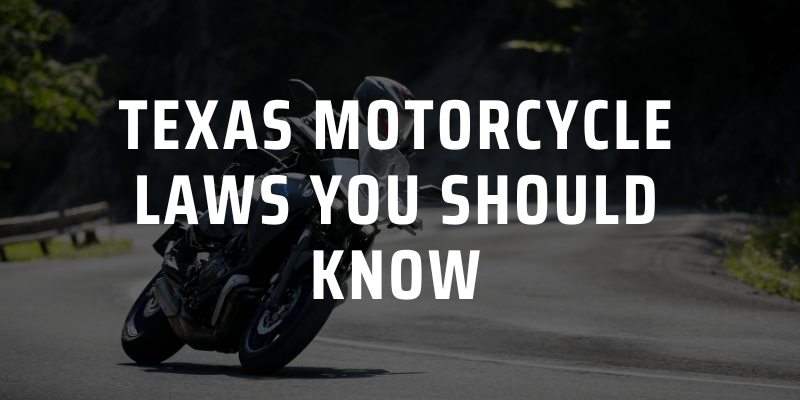Texas Motorcycle Laws & License Requirements
Texas has a unique set of rules and regulations aimed at ensuring the safety of motorcyclists and others on the roads. Here, the legal team at Craft Law Firm shares the laws and requirements that every rider should know.
Quick Links
- Licensing Requirements
- Lane Splitting Laws
- Helmet Laws
- Required Insurance
- Vehicle Equipment Laws
- Penalties For Non-Compliance

Licensing Requirements
To legally operate a motorcycle in Texas, individuals must obtain a Class M license. The process involves the following:
Age Requirements
Applicants must be at least 16 years old. Those under 18 must complete a Department of Public Safety (DPS)-approved Motorcycle Safety Course and hold a Class C learner license for at least six months.
Motorcycle Safety Course
Completion of a DPS-approved Motorcycle Safety Course is mandatory for all applicants under 18 and optional for those 18 and older. Successful completion may waive the road test requirement for applicants over 18.
Testing
Applicants must pass a written knowledge test covering motorcycle-specific traffic laws and a road skills test, unless waived by course completion.
If you bought a motorcycle from a dealership, they will most likely handle the registration process for you. On the other hand, if you buy a motorcycle from a private party, you must register it yourself at a Texas DMV.
Lane Splitting in Texas
Lane splitting involves riding a motorcycle between lanes of slow-moving or stationary traffic. Texas lacks specific regulations permitting or addressing lane splitting, rendering the practice illegal. It is strongly advised that riders avoid lane splitting to mitigate the risk of accidents and potential legal repercussions.
Texas Motorcycle Helmet Laws
In Texas, it is a legal requirement for motorcycle riders under 21 to wear a helmet. Riders over 21 are strongly encouraged to wear a helmet but are legally exempt if they have completed a motorcycle operator training course or have proof of insurance that covers motorcycle injuries.
Helmets must meet the safety standards established by the Texas Department of Transportation (TxDOT). As a result, a DOT-approved sticker must be affixed to the back of the helmet. Wearing a helmet is not only a legal obligation but also a crucial safety measure to safeguard against potential head injuries in the event of an accident.
Motorcycle Insurance
Similar to operating any motor vehicle, maintaining appropriate insurance coverage is crucial when riding a motorcycle in Texas. State law dictates that all motorcycle owners must possess liability insurance to provide coverage for potential damages or injuries resulting from an accident. The minimum coverage requirements are:
- $30,000 in bodily injury per person
- $60,000 in total bodily injury per accident
- $25,000 in property damage per accident
Keep in mind that only liability coverage is required, which will not pay for your losses if you cause a collision. There are other forms of optional coverage you can consider adding on, such as collision coverage.
Vehicle Equipment Laws
Motorcycles must be equipped with:
- At least one rearview mirror
- Functional headlamp and taillamp
- Operational brakes
- Properly working exhaust system
- Horn
- License plate lamp
- Rear red reflector
- Vehicle Identification Number (VIN)
These requirements are outlined in the Texas Transportation Code, Chapter 547.
Headlight Usage
Motorcyclists must keep their headlights illuminated at all hours, whether day or night. This requirement aims to improve visibility and facilitate the easier detection of motorcycles by other motorists. Alongside the headlight, motorcycles must be equipped with operational tail lights, brake lights, and turn signals. Regularly examining and upkeeping the lights on your motorcycle is essential.
Penalties for Non-Compliance
Failure to comply with Texas motorcycle laws can result in penalties, including fines, license suspension, and increased insurance premiums. For instance, the fine for operating a motorcycle without a license is around $195, and without insurance, it’s between $260 to $470. If you have multiple violations, the penalties increase and you may even face jail time. In addition, if you were involved in an accident, you may be personally liable for the resulting damages.
For help understanding how Texas laws can impact your motorcycle accident case or for a free case evaluation if you have been injured due to someone else’s negligence, contact a trusted Waco motorcycle accident lawyer today.
